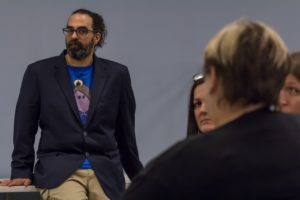On Tuesday, January 23, The Curse of the Coffee Cup, a symposium about the environmental impacts of disposable coffee cups, was simulcast at Camosun College’s two campuses. The event focused on how we can reduce or eliminate the use of paper and plastic coffee cups at Camosun.
“Camosun has for the past five or six years undertaken a waste audit. Previously, it was through an outside company, but for the past few years they’ve been doing it internally,” says Camosun Economics professor Becky Mason, who organized the symposium. “For 24 hours at each campus, they weigh, photograph, and categorize the garbage that we generate; historically, the big issue has been that roughly 90 percent of garbage that we generate should be recyclable, but we’re only hitting 30 to 40 percent. There’s this huge gap that I’ve always wanted to address; disposable coffee cups are just one of the many kinds of recyclable items, but it’s one that, I think, is easy to target, and that’s another reason why I brought together all of this event.”

To Mason, the event also helps showcase some of the problems that society has in accepting and adapting to these environmentally positive changes. She says that, to many people, one coffee cup can seem to have very little impact.
“The issue is that we’re asking people to make behavioural changes. I think especially with coffee cups, one cup can seem so inconsequential, but when you add them all together and look at the bigger picture, it becomes a societal issue,” says Mason. “It’s the problem of asking people to make individual changes that some perceive is a cost to them, that the disposable cups are of value to them, and so they don’t want to see them go away.”
Aramark food service director Donna Burger says that she feels the event wasn’t enough (Aramark runs Camosun’s Lansdowne cafeteria and Interurban’s Urban Diner, as well as the By the Books and Java Express coffee shops). She says that the turnout wasn’t as high as she wanted it to be or as it needed to be to effectively communicate the issues and to make a dent in solving the problems.
“I think it was a good start but it definitely wasn’t enough. The low number of people that attended just tells me that people think it’s not the most important thing. We all can be guilty of saying it’s important to us but never taking action, and that bothers me,” says Burger. “I would love to see Camosun hold something consistently about Aramark’s products and our commitment to sustainability in the on-boarding and orientation period of both students and faculty. If we want to walk the talk, I think that’s where we start.”
Burger says that she hopes larger companies start to take action on this issue, too. She says that Aramark does a good job at being sustainable where it can be, but she says that other companies will have to look at their shifting customer demographic and give environmentally sustainable products that more and more customers want.
“I hope that larger coffee companies will start to look at these 18-to-24-year-old demographics. This is important to them, and if they want them to be part of their customer base—and, let’s face it, that’s a very big part of their customer base—then they’re going to need to look at the trends,” says Burger. “I’m very passionate with this. I truly believe that we all need to start doing our part to make a change.”

